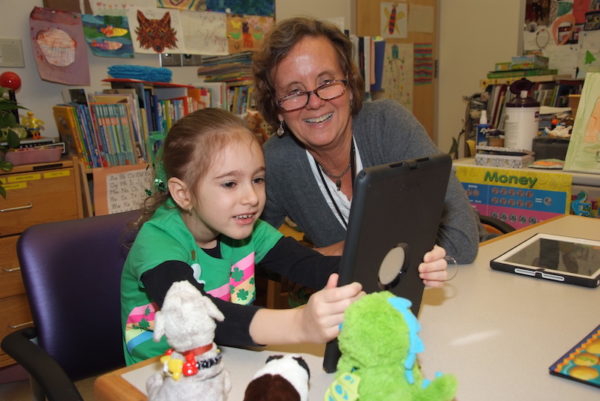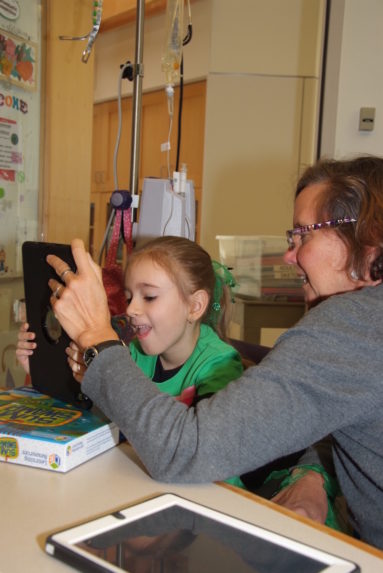Abby Snyder was an elementary school teacher in Portland, Maine for more than 20 years. Several years ago, one of her students was diagnosed with leukemia. (He just graduated from Boston College last spring and is doing great.)
When he was ill, Abby got very involved with his family and his treatment. “I spent a lot of time with him doing what I could as the local teacher to keep him connected with school and classmates,” she said. “I learned at that time, in and out of the hospital with him helping with school work, that there was a hospital-based teacher.”
She was inspired by her student and the idea of being a hospital-based teacher intrigued her. When an opportunity arose at The Barbara Bush Children’s Hospital, Abby didn’t hesitate to apply for the position. She was hired.
“When I saw the posting, I said I need that job,” she told me. “It’s a position not necessarily for the faint of heart. I have learned more things in the last five years that I certainly never would have learned as a classroom teacher.”
On the emotional side, the experience has put her own life into perspective. “I’m a mother of two,” she explained, “and I understand how fortunate I am. It sounds trite but it’s blatantly obvious every day I go to work. It can be very sobering.”
On the literal side, she’s gained an in-depth knowledge of the human body. “Initially, I attended medical rounds,” she said, “and learned about diagnoses and all the acronyms. It was overwhelming at first but I became truly fascinated with the human body and how complex it is. I have certainly seen a lot, some terribly sad, some mind boggling.”
She’s never quite sure what each school day will bring. In addition to any regular students, every morning she checks the census for new patients. I asked her about the day following our interview. “I know for sure that I have a second grader,” she answered, “and a first grader who just had a recent oncology diagnosis. She had a rough week just embracing her diagnosis and her family was whirling but after this weekend she will have school work in hand. She came into the classroom to poke around on Friday and left saying she couldn’t wait until Monday to go school.”
Only rarely does she have more than one child in the classroom — for various reasons, including infection control. Her objective is always to do authentic school work. “With the parent’s consent, I call the child’s school and collaborate with the teacher. We figure out either how to get the actual assignments the patient is missing or work with the teacher to replicate the projects.”
Even if kids don’t like school so much, Abby has found that having an in-hospital teacher can help normalize things for them. It can sometimes have a healing effect. “They know they’re doing the same work that their friends are doing,” she explained. “It makes the experience much more authentic and motivating. If a child is eager to come into the classroom and the teacher and I haven’t connected yet, typically, we’ll just engage in an art project or a word game or something that will get them out of their room and allow them to forget why they’re there in the first place.”
While she mostly works on her own, volunteer Anthony King helps out with older patients. Abby is certified to teach K through 8 and can cover all kinds of subjects but she draws the line at high-level math and science. That’s when she calls on Anthony.
“Sometimes he’s there every day for three weeks and then not at all for two weeks or every other day for a week or whatever. It’s very inconsistent, but with the two of us we can really meet the needs of all the kids on the unit.”
Lots of other people have volunteered to help as well, but she says having only one classroom and an inconsistent schedule makes utilizing volunteers a challenge. “It’s not like a regular classroom where you have 20 kids in a class that starts at nine o’clock and ends at three,” she said. “And it’s never a dull moment. Some days there’ s not enough of me and some days I can handle the load alone.”
She often collaborates with Leslie Morissette who runs an organization called Grahamtastic. It provides computer technology and robots to kids who can’t attend school because of an illness or medical condition. The organization is named in honor of Leslie’s 8-year-old son Graham, who died of leukemia in 1997.
“Leslie and I work very closely together,” said Abby. “Like this fall we had a patient who was here for a couple of months. She was a student in Augusta. Leslie and I brought a robot up to her school and we oriented the teacher. Then I utilized the robot with the patient from the hospital. For several weeks the patient called into her classroom from my classroom in the hospital.”
Abby believes she is the only hospital-based teacher in New England. “Boston Children’s Hospital does have an educational component to the services they provide to patients,” she said, “but I’m the only one who has her own little classroom. It’s a service offered to any school-aged patient who’s at Barbara Bush. It provides incentives to get better, even by having a distraction for kids who aren’t well enough to do schoolwork. I am very grateful that now my position is endowed



I have known Abby for a long time. She is one of the nicest most caring people I know.